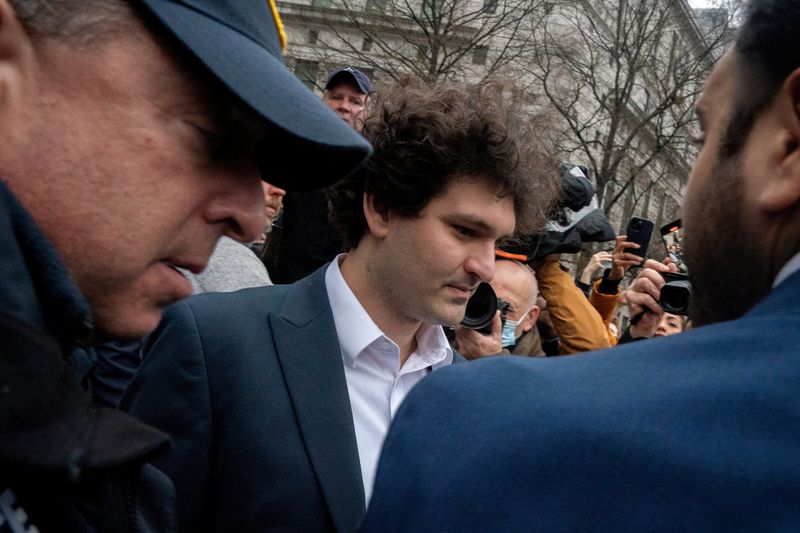By Luc Cohen
NEW YORK (Reuters) - Sam Bankman-Fried may find it hard to argue the fraud charges against him should be tossed because of uncertainty as to how U.S. law treats cryptocurrency, as other high-profile defendants in criminal cases involving digital assets have done.
That is because Manhattan federal prosecutors' charges against the founder of now-bankrupt crypto exchange FTX have largely sidestepped an ongoing debate as to whether cryptocurrencies should be regulated as securities or commodities, legal experts told Reuters.
Bankman-Fried, 30, was indicted on two counts of wire fraud and six conspiracy counts last month in Manhattan federal court for allegedly stealing FTX customer deposits to pay debts from his hedge fund, Alameda Research, and lying to equity investors about FTX's financial condition. He has pleaded not guilty.
"It's a pretty simple deception," said Shane Stansbury, a professor at Duke University School of Law and former Manhattan federal prosecutor. "You really don't need to get into the weeds of how we view cryptocurrencies."
The question of whether cryptocurrencies are considered securities, like stocks or bonds, or commodities - a category that in the United States encapsulates foreign currency trading as well as raw materials such as crude oil - remains largely unresolved.
But the uncertainty is irrelevant to most of the charges leveled against Bankman-Fried, according to experts. While he faces one count of conspiracy to commit securities fraud, that charge alleges he misled FTX's equity investors, and does not touch on the nature of the assets traded on the exchange.
He also faces two wire fraud charges and two related conspiracy counts for allegedly providing false information to Alameda lenders about the hedge fund's financial health and for the alleged theft of customer assets.
"There's no need to establish that what the customers ultimately bought with fiat currency was a security or commodity or whatever," said Mark Kasten, counsel at Buchanan Ingersoll & Rooney in Philadelphia. "Customers put money into the platform and the money was supposed to be used in a certain way. And according to the allegations in the indictment, it wasn't."
A spokesman for the U.S. Attorney's office in Manhattan declined to comment.
Bankman-Fried's defense lawyers did not respond to a request for comment. The onetime-billionaire has previously acknowledged shortcomings in FTX's risk management practices, but has said he does not believe he is criminally liable.
DEBATE COULD DECIDE REGULATION
Gary Gensler, the U.S. Securities and Exchange Commission (SEC) chairman, has said bitcoin is a commodity but that other digital assets behave more like securities - defined broadly as contracts in which investors profit from others' efforts - because their value derives from promotion.
The debate matters to cryptocurrency companies because it could determine which agency regulates the trading of digital assets. The U.S. Commodity Futures Trading Commission (CFTC) is seen by many crypto players as potentially friendlier than the better-funded SEC.
San Francisco-based blockchain payments company Ripple is contesting a 2020 SEC lawsuit accusing it of conducting an unregistered securities offering by arguing its XRP token is not a security and thus not subject to SEC oversight. The case is ongoing.
Damian Williams, the top federal prosecutor in Manhattan who took office in 2021, has made enforcement of cryptocurrency-related financial crimes a centerpiece of his tenure.
Last year, in the first-ever insider trading cases involving digital assets, his office brought wire fraud charges against Nathaniel Chastain, a former employee of non-fungible token (NFT) marketplace OpenSea, and Ishan Wahi, a former manager at cryptocurrency exchange Coinbase (NASDAQ:COIN) Global Inc.
Both have pleaded not guilty and argued the charges should be dismissed because insider trading charges must involve securities or commodities. In bringing wire fraud charges in both cases, prosecutors avoided taking a position on how cryptocurrencies or NFTs should be classified.
A judge in October denied Chastain's lawyers' motion to dismiss the charges.
It is unlikely Bankman-Fried's lawyers will attempt a similar argument because the wire fraud charges are more straightforward, Kasten said.
He said the Massachusetts Institute of Technology (MIT) graduate's defense would likely focus on the arguments that he had no intent to commit fraud, that other executives at FTX and Alameda bore the blame, and that he was not involved in the day-to-day operations of the companies.

But prosecutors could also prove wire fraud charges by establishing that a defendant willfully blinded himself to the consequences of his actions, said Victor Hou, a partner at Cleary Gottlieb and former Manhattan federal prosecutor.
"Wire fraud is a powerful and frequently used weapon in the prosecutor's arsenal because it captures an exceptionally broad range of illegal conduct," Hou said.